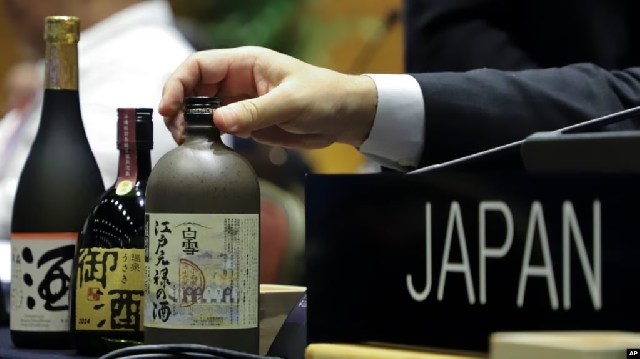Japan's sake joins UNESCO's cultural heritage list
 Japanese sake, listed as a nominee for Intangible Cultural Heritage, is displayed on Japan's delegation table during an UNESCO World Heritage Convention, in Asuncion, Paraguay, Dec. 4, 2024
Japanese sake, listed as a nominee for Intangible Cultural Heritage, is displayed on Japan's delegation table during an UNESCO World Heritage Convention, in Asuncion, Paraguay, Dec. 4, 2024
Sake is perhaps more Japanese than the world-famous sushi. It's brewed in centuries-old mountaintop warehouses, savored in the country's pub-like izakayas, poured during weddings and served slightly chilled for special toasts.
The smooth rice wine that plays a crucial role in Japan's culinary traditions was enshrined on Wednesday by UNESCO on its list of the "intangible cultural heritage of humanity."
At a meeting in Luque, Paraguay, members of UNESCO's committee for safeguarding humanity's cultural heritage voted to recognize 45 cultural practices and products around the world, including Brazilian white cheese, Caribbean cassava bread and Palestinian olive oil soap.
Unlike UNESCO's World Heritage List, which includes sites considered important to humanity like the Pyramids of Giza in Egypt, the Intangible Cultural Heritage designation names products and practices of different cultures that are deserving of recognition.
A Japanese delegation welcomed the announcement in Luque.
"Sake is considered a divine gift and is essential for social and cultural events in Japan," Kano Takehiro, the Japanese ambassador to UNESCO, told The Associated Press.
The basic ingredients of sake are few: rice, water, yeast and koji, a rice mold, which breaks down the starches into fermentable sugars like malting does in beer production. The whole two-month-long process of steaming, stirring, fermenting and pressing can be grueling.
The rice — which wields tremendous marketing power as part of Japan's broader cultural identity — is key to the alcoholic brew.
For a product to be categorized Japanese sake, the rice must be Japanese.
The UNESCO recognition, the delegation said, captured more than the craft knowledge of making high-quality sake. It also honored a tradition dating back some 1,000 years — sake makes a cameo in Japan's famous 11th century novel, The Tale of Genji, as the drink of choice in the refined Heian court.
Now, officials hope to restore sake's image as Japan's premier alcoholic drink even as the younger drinkers in the country switch to imported wine or domestic beer and whiskey.
"It means a lot to Japan and to the Japanese," Takehiro said of the UNESCO designation. "This will help to renew interest in traditional sake elaboration."
Also, Japanese breweries have expressed hope that the listing could give a little lift to the country's export economy as the popularity of sake booms around the world and in the United States amid heightened interest in Japanese cuisine.
Sake exports, mostly to the U.S. and China, now rake in over $265 million a year, according to the Japan Sake and Shochu Makers Association, a trade group.
Japan's delegation appeared ready to celebrate on Wednesday — in classic Japanese style.
After the announcement, Takehiro raised a cypress box full of sake to toast the alcoholic brew and cultural rite.
Source: apnews.com
Trending World

M23 declares ceasefire in DRC as regional leaders try to forge peace
00:40
US tariffs on Chinese goods go into effect
12:55
Haiti's gangs have 'taken a step back,' transitional leader says
00:58
UN mission in DR Congo under scrutiny as conflict escalates
00:47
Israel, Hamas begin third exchange of hostages, prisoners under ceasefire
13:40
Hamas announces names of hostages to be released Saturday
22:00
Many across Africa shocked by 90-day freeze on US aid
21:56
More than 40 bodies recovered from Washington midair collision
21:52
Israel targets Hezbollah sites in Lebanon, accuses group of ceasefire breach
13:11
UN rights chief seeks $500 million in 2025, warning that lives are at risk
01:03



